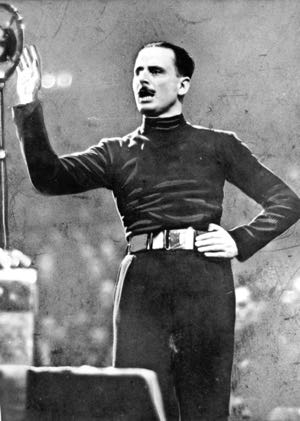
Oswald Mosley in Exeter
and the British Union of Fascist
Page added 25th November 2015
During the 1930s, the British Union of Fascists became a popular movement with some, and reviled by many others. It was a movement that would provoke secrecy and embarrassment by many who had supported them in the years leading up to the Second War. Following the outbreak of war, and later, the discovery of the concentration camps in 1945, involvement with the movement was quietly dropped by many former members
Mosley was a Labour MP for Harrow until 1924, and then for Smethwick between 1926 and 1931. He was a minister in the Labour Government between 1929 and 1931. He disagreed with the Government’s policy on unemployment, resigned and formed the New Party, which merged with the British Union of Fascists in 1932. So what was Mosley doing in Exeter?
The Fascists in Exeter
The Fascist movement were present before Mosley first visited the city–they held public meetings in the city, one of which was in Gervase Avenue on 22 August 1933.
Mosley visited Plymouth, Bodmin and Exeter in December 1933, accompanied by “his Blackshirt thugs”. He spoke at a meeting in the Civic Hall, which was followed by questions from the audience. He was accused of running “a one man band”, and when questioned about the origin of the ‘blackshirt’–he replied that “something ‘more British’ could not be found then a black shirt for a uniform.” He spoke of other Fascist meetings that were broken up by “Reds with razors” to which some in the audience shouted “Liar”. When questioned further he said that under Fascism, Britain would be prepared to disarm, if other countries did the same. There would be a Three Year Plan for smallholders and religious bodies and youth movements such as the Scouts and Guides would not be interfered with.
The Fascists opened an area HQ at 85 South Street in 1933. In February 1934 an anonymous card was put through the door with the words "Be prepared. Four hours to go. Who is the maniac? There are other ways besides fires. Fascists beware!” Rocks were often thrown through the windows, and the branch closed later in the year, not due to opposition, but due to lack of funds. The movement had quite a lot of support in the agricultural sector, with one farmer entering a prize bull named Stowey Fascist at the Devon County Show.
By 1936, Exeter became the main city in the south-west for the British Union of Fascists, prompted by importing a member from Newcastle to revive the movement. Opposition was also rising, and there were as many as seven fires set at the Rougemont Hotel when the Fascists’ were meeting. A note was left when one fire was set reading “Down with Fascism, rulers in Britain”.
A new HQ was opened at 7 Queen Street, next to the Higher Market, while interest in the movement during February 1937 was particularly high, with many attending meetings and requesting literature. A meeting in the same month at the Buller Hall, St Thomas was subject to some lively heckling. The speaker was Clement Buning from London.
The Civic Hall
Mosley’s appearance at the Civic Hall on the 9 July 1937 would prove to be his most controversial. In his speech, to an audience of 1,500, Mosley spoke of the Jews:
“We say that Jews may not stay in this country organising as a State within the State, setting the interest of their own race above the interest of the nation as a whole. Therefore such Jews will have to leave Great Britain, and I do not disguise the opinion that the only final solution for the Jewish problem of the world is for the Jews should go together to another land in one of the many unpopulated ares of the world and become themselves a nation.”
His phrasing 'final solution' would prove to predict events in Nazi Germany a few years later. Despite a large presence of 'red' (Labour) opposition, there was little trouble at this meeting.
However, other Fascist meetings in Exeter were often subject to the presence of a more hostile ‘red’ Labour opposition. On the 16 October 1937, the police escorted the speaker and other members of the party back to the HQ in Queen Street, harassed by 400 to 500 protestors. One speaker was banned from public speaking until May 1938, because of his inflammatory style.
Through 1938 Mosley himself would often appear in Exeter, speaking from on top of a van, normally in Market Street–it was almost always accompanied by heckling, and sometimes rotten fruit was thrown at him.
The advent of war in September 1939 was a turning point for the Fascist movement, as suddenly, the enemy was seen to be the German fascists, better known as the Nazis. On 7 June 1940 the police raided the new South Street premises and arrested leading figures in the movement, closing down the HQ. That was the end of the movement in Exeter until after the war, when there are periodic attempts by a minority to revive the movement.
Sources: The British Newspaper Archive and the Blackshirts in Exeter by Hector Niel-Mee, Community Researcher, Telling Our Stories, Finding Our Roots; Exeter’s Multi-Coloured History and Wikipedia.
│ Top of Page │
